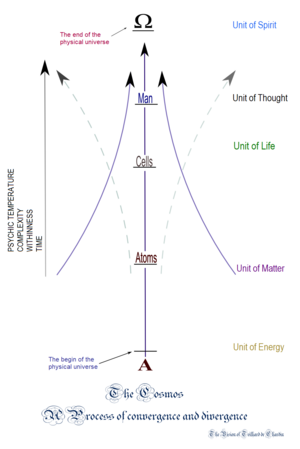From Wikipedia:
Teilhard's phenomenology
Teilhard himself claimed his work to be phenomenology.
Teilhard studied what he called the rise of spirit, or evolution of consciousness, in the universe. He believed it to be observable and verifiable in a simple law he called the Law of Complexity/Consciousness. This law simply states that there is an inherent compulsion in matter to arrange itself in more complex groupings, exhibiting higher levels of consciousness. The more complex the matter, the more conscious it is. Teilhard proposed that this is a better way to describe the evolution of life on earth, rather than Herbert Spencer's "survival of the fittest." The universe, he argued, strives towards higher consciousness, and does so by arranging itself into more complex structures.
Teilhard identified what he termed to be different stages in the rise of consciousness. These stages are analogous to what are termed the geosphere and the biosphere. The Law of Complexity/Consciousness traces matter's path through these stages, as it 'complexifies' upon itself and rises in consciousness. Teilhard claimed that although it is not evident, consciousness (in an extremely limited degree) exists even in rocks, as the Law of Complexity/Consciousness implies. In plants, matter is complex enough to exhibit a consciousness that is the very life of the plant. In animals, matter is complex enough to an extraordinary degree to where consciousness shows itself in a wide range of reactionary movement to the whole universe.
However, Teilhard here proposed another level of consciousness, to which human beings belong, because of their cognitive ability; i.e. their ability to 'think'. Human beings, Teilhard argued, represent the layer of consciousness which has "folded back in upon itself", and has become self-conscious. Julian Huxley, Teilhard's scientific colleague, described it like this: "evolution is nothing but matter become conscious of itself."[citation needed]
So in addition to the geosphere and the biosphere, Teilhard posited another sphere, which is the realm of human beings, the realm of reflective thought: the noosphere.
In the noosphere Teilhard believed the same Law of Complexity/Consciousness to be at work, although not in a way previously seen. He argued that ever since human-beings first came into existence 200,000 years ago, the Law of Complexity/Conscious began to run on a different (higher) plane. Consciousness in the universe, he argued, now continues to rise in the complex arrangement and unification (Teilhard sometimes called it 'totalization')[citation needed] of mankind on earth. As human beings converge around the earth, he reasoned, unifying themselves in ever more complex forms of arrangement, consciousness will rise.
Finally, the keystone to his phenomenology is that because Teilhard could not explain why the universe would move in the direction of more complex arrangements and higher consciousness, he postulated that there must exist ahead of the moving universe, and pulling it along, a higher pole of supreme consciousness, which he called Omega Point.
Teilhard re-interpreted many disciplines, including theology, sociology, metaphysics, around this understanding of the universe. A main focus of his was to re-assure the converging mass of humanity not to despair, but to trust the evolution of consciousness as it rises through them.



Nessun commento:
Posta un commento